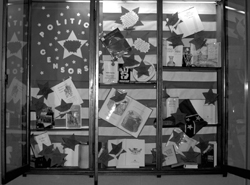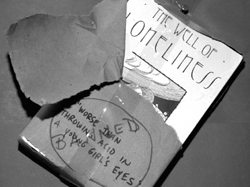By Wanda Monroe
University Library

What do the Harry Potter book series, Gone with the Wind and The Merchant of Venice have in common? They all have complex characters and plots, and they are all books that have been banned or challenged. They also are part of a new exhibition at the Harlan Hatcher Graduate Library.
“Banned Books and the Freedom to Read” includes books that have been banned or challenged for social, religious, sexual or political reasons. The exhibition is organized in showcases by category and includes a special case of books banned or challenged in the state of Michigan. Another case presents a “keyhole” display that allows a sneak peek at books deemed “dangerous.” As visitors look through the keyholes of this display, they can see the books, the names of the authors, those responsible for banning the books and the reasons they were banned.
Marna M. Clowney and Lynne N. Gunderman, information resources supervisors, and Laura E. Nottley, information resources assistant, at the Harlan Hatcher Graduate Library, developed the exhibition after learning that the Harry Potter books had been banned in some places.
“Once we learned that Harry Potter had been banned, we decided that banned books would be our theme,” Clowney says. “Because we deal so closely with books, journals and other information resources on a daily basis, we agree with the American Library Association (ALA) that as American citizens, we have the right to read what we want to read.”

Regardless of what books or material various communities or organizations deem “unfit” or ban, the ALA, to which the University Library belongs, says, “The free expression of ideas as embodied in the First Amendment is a basic human right. As American citizens, we have the right to read what we want to read, hear what we want to hear, watch what we want to watch and think what we want to think.
“Intellectual freedom is the right to seek and receive information from all points of view, without restriction, even those ideas which might be highly controversial or offensive to others.”
This and other information about banned and challenged books can be found at the association’s Web site, www.ala.org, along with answers to such questions as why books are challenged, who challenges books, and what is the difference between a challenge and a banning. The site also lists the most frequently challenged books and authors of 2000.
The exhibition is on display through September in the lobby on the first floor of the Harlan Hatcher Graduate Library North. The Graduate Library is open 8–2 a.m. Monday–Thursday, 8 a.m.–10 p.m. Friday, 10 a.m.–6 p.m. Saturday and 1–10 p.m. Sunday. The banned books exhibition is free and open to the public. The ALA will mark Banned Books Week Sept. 22–29.

